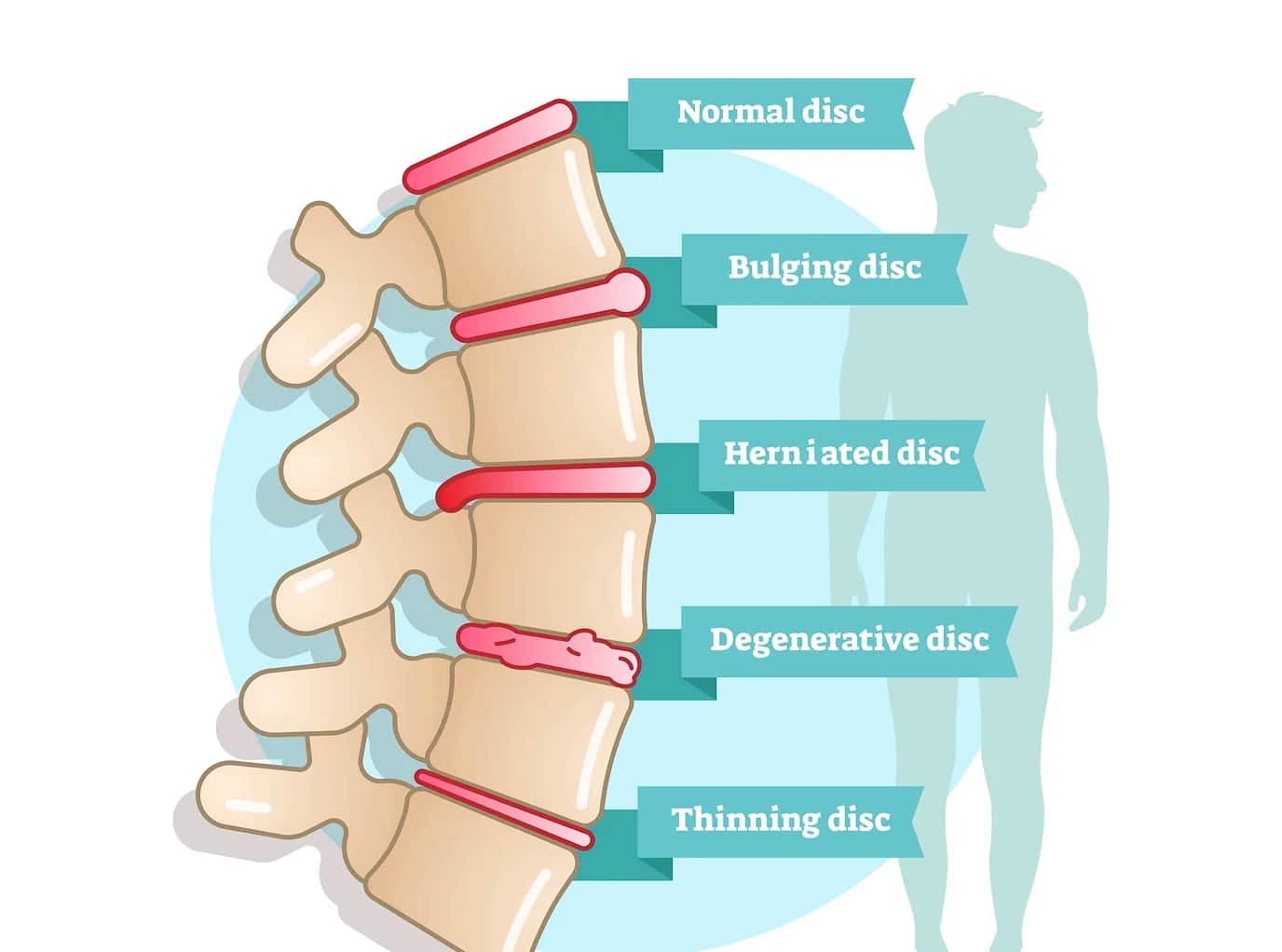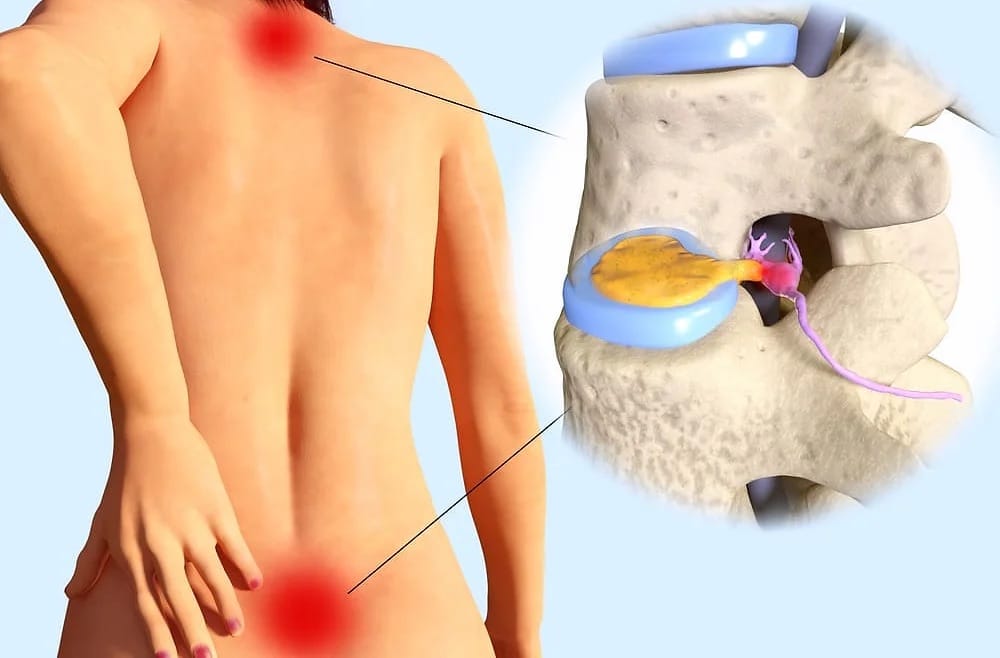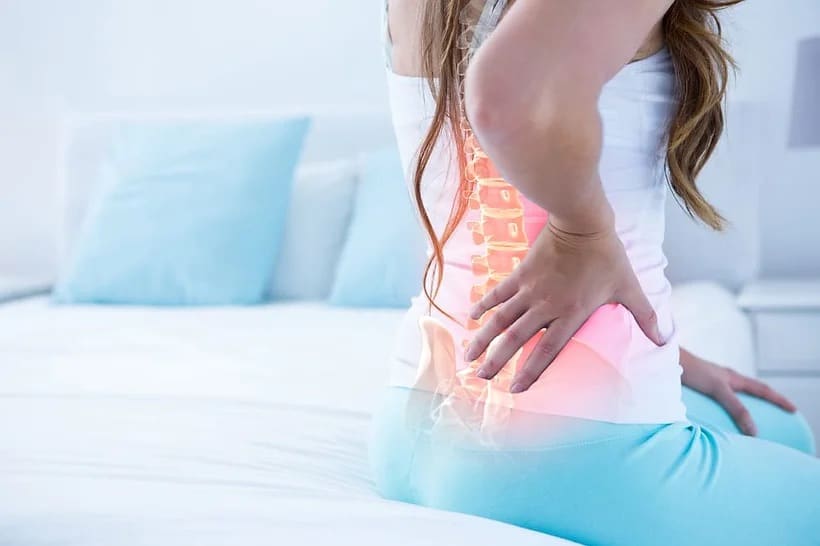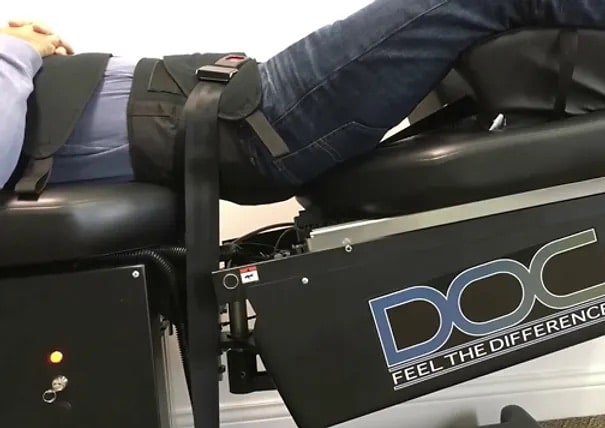
A herniated disc is a condition that can occur anywhere along the spine, but most often occurs in the lower back and neck. It is sometimes called a bulging, protruding or extruded disc depending on its severity. It is one of the most common causes of lower back and neck pain, as well as leg pain or “sciatica.”
Between 60% and 80% of people will experience low back pain at some point their lives. Some of these people will have low back pain and leg pain caused by a herniated disc. But just because you have a herniated disc does not mean you will have pain, in fact about 50% of the population have a disc herniation without any symptoms.
At times though a herniated disc can be very painful, but most people feel much better with just a few weeks or months of nonsurgical chiropractic treatment.
In between your vertebrae are flexible intervertebral discs. These discs are flat and round, and about a half inch thick.
Intervertebral discs act as shock absorbers when you walk or run. They are made up of two components:
Annulus fibrosus. This is the tough, flexible outer ring of the disc is made up of cartilaginous rings or bands which encircle the nucleus.
Nucleus pulposus. This is the soft, jelly-like center of the disc.
A disc begins to herniate when its jelly-like nucleus pushes against its outer ring due to wear and tear or a sudden injury. This pressure against the outer ring may cause lower back pain or neck pain.
If the pressure continues, the jelly-like nucleus may push all the way through the disc’s outer ring or cause the ring to bulge. This puts pressure on the spinal cord and nearby nerve roots. In addition, the disc material releases chemical irritants that contribute to nerve inflammation.
When a nerve root is irritated, there may be pain, numbness, and weakness in one or both of your legs, a condition called “sciatica.”

Gender. Men between the ages of 20 and 50 are most likely to have a herniated disc.
Improper lifting. Using your back muscles instead of your legs to lift heavy objects can cause a herniated disk. Twisting while you lift can also make your back vulnerable. Lifting with your legs, not your back, may protect your spine.
Weight. Being overweight puts added stress on the discs in your lower back.
Repetitive activities that strain your spine. Many jobs are physically demanding. Some require constant lifting, pulling, bending, or twisting. Using safe lifting and movement techniques can help protect your back.
Frequent driving. Staying seated for long periods, plus the vibration from the car engine, can put pressure on your spine and discs.
Sedentary lifestyle. Regular exercise is important in preventing many medical conditions, including a herniated disc.
Smoking. It is believed that smoking lessens the oxygen supply to the disc and causes more rapid degeneration.
A recent research study reviewed records from 1,450 patients in the Ohio Bureau of Workers’ Compensation database who had diagnoses of disc degeneration, disc herniation or radiculopathy, a nerve condition that causes tingling and weakness of the limbs.
Half of the patients had surgery to fuse two or more vertebrae in hopes of curing low back pain. The other half had no surgery, even though they had comparable diagnoses.
After two years, just 26 percent of those who had surgery had actually returned to work. That’s compared to 67 percent of patients who didn’t have surgery. In what might be the most troubling study finding, researchers determined that there was a 41 percent increase in the use of painkillers, specifically opiates, in those who had surgery.
“The study provides clear evidence that for many patients, fusion surgeries designed to alleviate pain from degenerating discs don’t work”, says the study’s lead author Dr. Trang Nguyen, a researcher at the University of Cincinnati College of Medicine.
So if surgery is not the most effective for correcting a disc herniation what are some of the alternatives?
Chiropractic adjustments and Spinal Decompression
Lifestyle modifications and exercises
Medications- such as NSAIDs, pain killers, and muscle relaxers.
Injections-Steroid injections into the back in the herniated disc may help control pain for several months. Such injections reduce swelling around the disc but long term may weaken disc and cartilage.

Medications and Injections have their place in treating musculoskeletal conditions such as disc herniation’s because they can reduce soft tissue swelling around the disc. They can also give relief to patients in which the pain is unbearable.
The problem is medication and injections only mask the pain and create further damage with long term use. This is why at Health In Motion we recommend non-surgical spinal decompression, chiropractic adjustments and life style modification (losing weight, exercising, stretches, proper ergonomics etc.)
What is Spinal Decompression? Decompression is a form of therapy that relieves pressure that builds up on the discs and nerves. The task of relieving pain comes about as a result of drawing areas of herniated disc material back into the center.
Decompression achieves this by creating negative pressure within the disc, referred to as negative intra-discal pressure. This creates essentially a vacuum to draw the bulging and herniated disc material back into the disc space and relieves pressure on surrounding nerves. As the ligaments that hold disc material in place become stretched or torn due to bulging and herniation, decompression strengthens the ligament bands that hold the disc material in place to heal & prevent future recurrence.
Decompression also allows for perfusion of spinal fluid into the disc and waste products out, which also aids in the healing and health of the disc. The decompression table is computerized and the procedure is relatively pain free with many patients falling asleep due to the relief they feel during the procedure, mild soreness is normal after the initial several treatments but after the disc starts to heal the soreness also disappears.
In most cases the healing process requires only a few weeks of treatment on an out-patient basis. Patients come to Health In Motion Chiropractic to return to a normal pain free life. While no treatment is full proof and disc herniation’s can take months or even years to heal. Spinal decompression offers patients a better non-invasive alternative from traditional surgery to correct disc herniation’s. Call us today to find out how we may be able to help you live a pain free life 386-320-0325.
Call us today at (386)-320-0325 for relief of your symptoms or for assistance in reaching optimal health.

Call us today at (386)-320-0325 for relief of your symptoms or for assistance in reaching optimal health.
